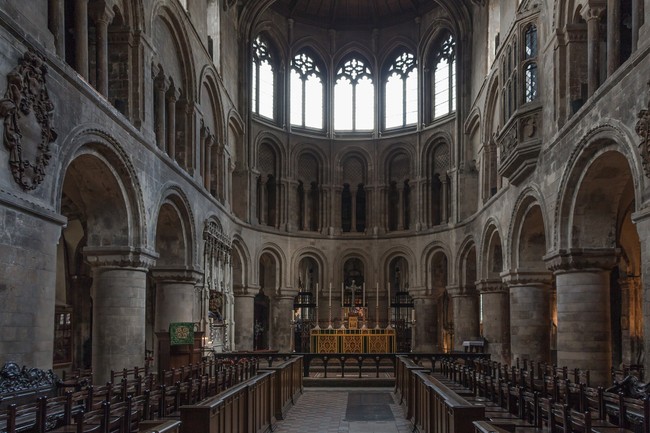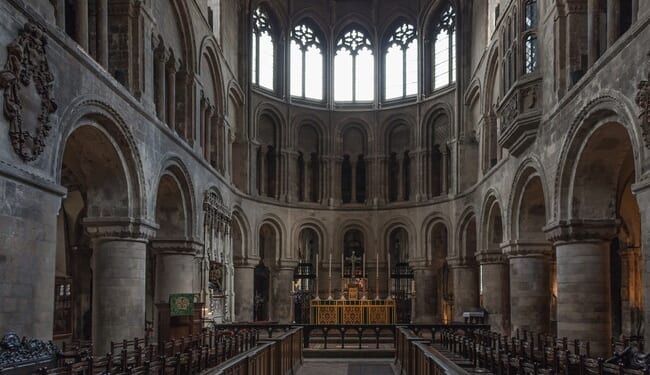
Conventional wisdom tells us that religious faith is on a downward slope, particularly when it comes to Christianity. Of course, there aren’t many ways to separate nominal Christians from genuine believers when compiling statistics, but many measurements show that Christianity is on the decline in the West.
The state of Christianity in Europe can be discouraging. The continent that was once the heart and soul of Christendom is increasingly godless. But is there encouragement on the horizon? One podcaster and writer thinks so.
Justin Brierly, the author of “The Surprising Rebirth of Belief in God” and host of the “Unbelievable” podcast, writes in The Spectator that the tide of secularism in the UK might be turning back toward Christianity. He points out that Britain’s churches are seeing a resurgence years after the “New Atheists” began to declare the end of religious faith.
Brierly begins by relating a visit to an Evensong service at St. Bartholomew the Great, the oldest church in London with Tom Holland, the historian and author. Even though his typical worship experience isn’t high-church like St. Bart’s, Brierly found the “smells and bells” engaging and beautiful.
Holland considered himself an agnostic, although the research for his best-seller “Dominion: How the Christian Revolution Remade the World” led him to reconsider faith in Jesus. He hasn’t made the leap yet, but it’s encouraging that he is trying to embrace the church experience. Holland, Brierly writes, “came to realize he was still essentially Christian in terms of his beliefs about human rights, equality, and freedom.”
“Holland is not alone as an agnostic trying out church again,” Brierly continues. “In contrast to the usual ageing demographic of many Anglican churches, the congregation of St. Bart’s seems to mainly consist of young professionals, both male and female. I noticed a famous politician among the gathered faithful, and was told that a well-known melancholy rock star has also been frequenting the church of late.”
Recommended: Is a True Conservative Movement Rising in the UK?
Brierly recalls the explosion of the New Atheist movement in the early part of this century, in which bold and insistent non-believers called for shaking off the shackles of religion. Their vision, which wasn’t merely lacking in faith but anti-faith in many cases, has finally begun to face its challenges.
“All that our post-Christian society has delivered so far is confusion, a mental health crisis in the young, and the culture wars,” he writes. “It’s not surprising then that a movement of New Theists has sprung up.”
Notable thinkers and media personalities like Jordan Peterson, Douglas Murray, Joe Rogan, and Holland have talked about the value of Christianity to Western culture. Ayaan Hirsi Ali, once heavily under the influence of the New Atheists, has embraced faith in Jesus, and Russell Brand has reportedly become a Christian as well. Even Richard Dawkins, one of the New Atheist heroes, has praised the positive effects of Christianity.
However, as Brierly points out, talking the talk about Christianity without walking the walk is futile and hollow:
If conservative-leaning intellectuals only “cosplay” at Christianity (Tom Holland’s phrase) without really believing it, then this “New Theist” movement will inevitably fade away. Co-opting Christianity in the cause of an anti-woke agenda or in order to fend off radical Islam turns it into a useful political tool, but drains it of any life-giving power. A Christian nationalism of the right will become as pallid and pointless as the Christianity of the progressive left that parrots the latest politically correct talking points.
However, they say God moves in mysterious ways. As a believing Christian, I see signs that he is moving in the minds and hearts of secular intellectuals. Many of them are recognizing that secular humanism has failed and, against all their expectations, seem to be on the verge of embracing faith instead.
Brierly digs deeper into Holland’s story. While filming a documentary in Iraq, seeing the brutality of ISIS — including crucifixion — moved him, and a mystical experience in an abandoned Iraqi church got his attention. Holland also believes that prayer healed him of a cancer diagnosis in late 2021. He admits that his experiences are unlikely to soften the most hardened heart and that his experiences “won’t fit neatly into every Christian box,” but he is moving closer to faith as a result of them.
The encouragement of notable figures lauding and even embracing Christianity still flies in the face of the statistics that show religiosity on the decline, but Brierly points out the increase in church attendance, prayer, and belief in God among young men in Finland. He notes that this movement “might just be a weird anomaly (this hasn’t been recorded in other Nordic countries), or it may be a canary in the coal mine.” Either way, it’s encouraging.
“As a Christian I believe things that are dead can come back to life,” Brierly concludes. “That’s the point of the story after all.” That’s why we should keep praying for people to come to faith in Jesus in the UK, in the U.S., and throughout the world.












